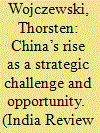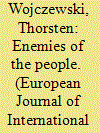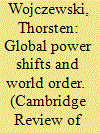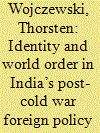| Srl | Item |
| 1 |
ID:
143934


|
|
|
|
|
| Summary/Abstract |
The simultaneous rise of China and India is one of the most important developments in contemporary world politics. Given their steadily growing power and aspirations and China’s more assertive posture in Asia, the management of China’s rise is one of the major challenges for India’s foreign policy. However, India is often said to have no guiding strategic framework for its China policy, which is seen as incoherent and reactive. This article, by contrast, shows that India has an evolving China strategy and that the alleged inconsistencies in India’s China policy are rather the result of an ambivalent image of China. Drawing on constructivism and discourse analysis, the article identifies the dominant perception of China in India’s foreign policy discourse and the resulting foreign policy strategy. In a next step, the article analyzes the China policy of the Congress-led UPA Government and investigates whether it conforms to the strategic policy frame of the dominant China discourse.
|
|
|
|
|
|
|
|
|
|
|
|
|
|
|
|
| 2 |
ID:
171785


|
|
|
|
|
| Summary/Abstract |
Populists are on the rise across the globe and claim to speak on behalf of ‘the people’ that are set against the establishment in the name of popular sovereignty. This article examines how populist discourses represent ‘the people’ as a referent object that is threatened and the form and implications of this populist securitisation process. Drawing on securitisation theory and poststructuralism, the article understands populist securitisation as a discursive practice that propagates a politics of fear, urgency, and exceptionality in order to mobilise ‘the people’ against a ‘dangerous’ elite and normalise this antagonistic divide of the social space. While the proposed theoretical framework aims to clarify the relationship between poststructuralist and securitisation theory and capture the nexus between populism and security, the case of populism broadens the scope of potential subjects of security and poses important challenges to existing theoretical assumptions about security as something designated by states’ representatives and ‘security experts’. The article develops and illustrates its arguments with a case study on the (de)securitisation moves in the populist discourse of Donald Trump.
|
|
|
|
|
|
|
|
|
|
|
|
|
|
|
|
| 3 |
ID:
160080


|
|
|
|
|
| Summary/Abstract |
Given growing awareness for ‘global power shifts’ and the ‘Western’-centrism of International Relations (IR), this article re-conceptualizes the phenomena subsumed under these two labels. By understanding ‘global power shifts’ and ‘world order’ as discursive phenomena, the article argues that discourses by fixing particular meanings and identities constitute the objects and subjects of which they speak. The discourses on ‘Global power shifts’ and ‘Post-Western IR’ are an expression of a hegemonic struggle over meanings and identities, resulting from the dislocation of existing meaning-systems and identities and enabling ‘new’ agents to assert particular representations of the world as universal. Drawing on the notion of discursive hegemony, developed by Ernesto Laclau and Chantal Mouffe, the article develops an analytical framework for conceptualizing the evolution and implications of this shift in representational power in the field of IR.
|
|
|
|
|
|
|
|
|
|
|
|
|
|
|
|
| 4 |
ID:
164037


|
|
|
|
|
| Summary/Abstract |
This article examines the dominant conception of world order in India’s post-Cold War foreign policy discourse. Drawing on a poststructuralist, discourse-theoretical framework, I argue that the discourse uses foreign policy and world order as sites for the (re-)production of India’s identity by placing India into a system of differences that constitutes ‘what India is’. The article shows that India’s foreign policy discourse frames world order in accordance with India’s own national experiences and thus seeks to upheave India’s identity to a position from where it can represent the universal: a global political community. This notion of Indian Exceptionalism constitutes the affective dimension of the discourse that obscures the absence of an extra-discursive foundation on which national identities could be grounded by endowing the Self with an imaginary essence and seemingly unique qualities.
|
|
|
|
|
|
|
|
|
|
|
|
|
|
|
|